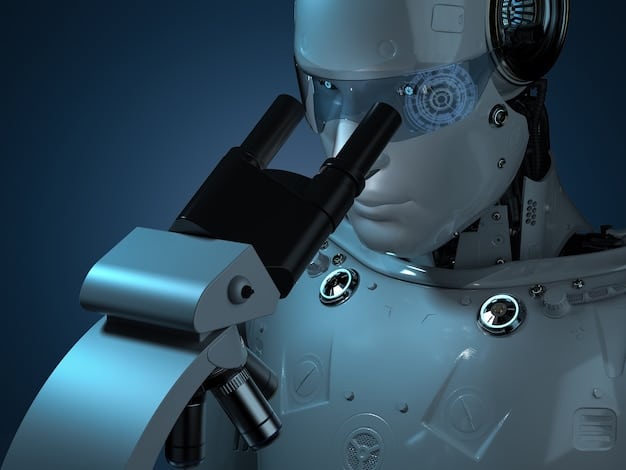Revolutionizing Industries: A Deep Dive into Innovative Startups

Innovative startups are transforming industries across the United States by introducing novel solutions, business models, and technologies. From sustainable solutions to cutting-edge AI, these companies are reshaping markets and driving economic growth.
The landscape of business is constantly evolving. **Innovative startups** are at the forefront of this change, disrupting established industries and creating entirely new markets. Keep reading to discover how these companies are impacting the world!
The Rise of Disruptive Innovation
Disruptive innovation, a term coined by Harvard Business School professor Clayton Christensen, describes a process by which a product or service initially takes root in simple applications at the bottom of a market and then relentlessly moves up market, eventually displacing established competitors. It’s fundamentally reshaping industries, and startups are the primary drivers of this change.
Understanding Disruptive Technology
Disruptive technologies are not just new inventions; they transform the way consumers, businesses, and markets operate. These technologies have the power to create significant value, impact customer experience, and shift market dynamics. They often leverage advancements in digital technology to streamline, automate, or innovate existing processes.
- Enhanced Efficiency: Disruptive technologies cut costs and improve productivity.
- New Business Models: They enable startups to explore and implement innovative business models, attracting new customer bases and creating new revenue streams.
- Increased Accessibility: They democratize access to products and services that were once available to only a select few.

What distinguishes a disruptive innovation is often its simplicity and affordability. Early adopters may find initial versions less appealing than established options, but as the innovation improves and becomes more efficient, it begins to appeal to a broader customer base, eventually challenging and displacing the incumbents.
Spotlight on GreenTech Startups
GreenTech startups are becoming increasingly important in the United States and worldwide as environmental concerns drive demand for sustainable solutions. These innovative companies are developing and implementing technologies that aim to reduce environmental impact, promote renewable energy, and address climate change.
Renewable Energy Innovations
GreenTech startups are focusing on renewable energy innovations such as enhanced solar panels, wind turbine technology, and energy storage solutions. Their efforts aim to make green energy more accessible, affordable, and efficient.
- Advanced Solar Materials: Using perovskite materials to increase solar panel efficiency.
- Smart Grid Technologies: Developing digital platforms that optimize energy distribution and reduce waste.
- Energy Storage Breakthroughs: Creating innovative battery technologies and energy storage systems for renewable energy sources.
The demand for clean energy solutions will continue to grow as governments and consumers prioritize sustainability. GreenTech startups will play a crucial role in shaping the future of energy production and consumption.
AI and Machine Learning Innovations
Artificial intelligence (AI) and machine learning (ML) remain pivotal areas for startup innovation. These technologies are enabling companies to automate tasks, personalize experiences, and derive insights from vast amounts of data. Startups in the AI and ML space are fundamentally changing how businesses operate and how consumers interact with technology.
AI-Powered Healthcare Solutions
Many AI and ML startups are dedicated to transforming healthcare. They develop solutions for disease diagnosis, personalized treatment plans, and efficient medical research.

- AI Diagnostic Tools: Using machine learning algorithms to improve early and accurate disease detection.
- Personalization Medicine: Developing AI-driven platforms for tailored treatment plans based on individual patient profiles.
- Drug Discovery: Utilizing AI to accelerate drug discovery and development processes, reducing the time and cost associated with bringing new treatments to market.
As AI and ML continue to advance, these technologies will undoubtedly lead to further groundbreaking developments across various industries, making processes more efficient and solving complex problems more effectively.
FinTech Startups Reshaping Financial Services
Financial technology (FinTech) startups play a crucial role in modernizing and democratizing the financial services industry. These innovative companies are leveraging technology to provide more accessible, efficient, and user-friendly financial solutions. They cover a wide range of services from payment processing and lending to investment management and insurance.
Blockchain and Cryptocurrency
Blockchain technology and cryptocurrencies are at the forefront of FinTech innovation, offering decentralized, secure, and transparent financial solutions. Startups are developing blockchain-based platforms that streamline transactions, reduce fraud, and offer more inclusive financial services.
- Decentralized Finance (DeFi): Creating decentralized platforms that offer lending, borrowing, and trading services without intermediaries.
- Secure Payment Systems: Developing blockchain-based payment solutions that provide enhanced security and reduced transaction costs.
- Smart Contracts: Utilizing smart contracts to automate and enforce contractual agreements, reducing administrative overhead and improving transparency.
The FinTech sector’s potential for continued disruption and innovation is significant, driven by growing demand for more efficient, transparent, and accessible financial services.
The Impact of EdTech Startups
Education technology (EdTech) startups are revolutionizing how we learn and access educational resources. These companies are developing digital tools and platforms that personalized education, making it more accessible, engaging, and effective.
Personalized Learning Platforms
EdTech startups focus on creating adaptive learning platforms that cater to individual student needs. These platforms use AI and ML to analyze student performance and adjust content accordingly, ensuring that each student receives a tailored educational experience.
- Adaptive Assessment Tools: Designing AI-powered assessment tools that adjust difficulty based on student performance.
- Interactive Course Content: Developing engaging content that incorporates gamification and multimedia elements to improve retention.
- Remote Learning Solutions: Providing platforms that facilitate remote learning, offering scalable access to education for students in diverse locations.
EdTech startups are pivotal in addressing the evolving needs of today’s students, equipping them with the skills and knowledge required for success in the digital age.
Healthcare Innovation Beyond AI
Beyond AI, innovative startups are driving progress in healthcare through various biomedical advancements and digital health solutions. These companies are focusing on areas such as telemedicine, personalized medicine, and medical device innovation to improve patient outcomes and healthcare accessibility.
Telemedicine and Remote Patient Monitoring
Telemedicine startups are transforming healthcare delivery by providing remote consultations, virtual check-ups, and remote patient monitoring solutions. These technologies expand access to healthcare services and improve patient engagement.
- Virtual Consultation Apps: Apps that enable remote consultations and virtual doctor visits.
- Wearable Health Monitors: Devices that continuously monitor vital signs and transmit data to healthcare providers.
- Remote Diagnostics Tools: Tools enabling remote diagnostics and monitoring of chronic conditions.
Startups in the healthcare sector are instrumental in building a more efficient, accessible, and patient-centered healthcare system.
| Key Point | Brief Description |
|---|---|
| 🌱 GreenTech Startups | Focus on sustainability and renewable energy solutions. |
| 🤖 AI Innovations | Applying AI and ML across industries, from healthcare to finance. |
| FinTech Revolution | Modernizing financial services with blockchain and digital payment solutions. |
| 🧑🏫 EdTech Impact | Transforming education through personalized learning platforms and remote solutions. |
Frequently Asked Questions
▼
An innovative startup is a company that introduces new products, services, or business models to address unmet needs or disrupt existing markets with novel solutions.
▼
GreenTech startups develop and implement technologies that promote renewable energy, reduce carbon footprints, and address environmental challenges, fostering sustainability.
▼
AI and ML enable startups to automate tasks, personalize experiences, derive insights from data, and develop intelligent solutions across diverse industries, driving innovation.
▼
FinTech startups modernize financial services by offering accessible, efficient, and user-friendly solutions, leveraging blockchain and digital payment technologies to restructure traditional finance.
▼
EdTech startups enhance education through personalized learning platforms, adaptive assessment tools, and interactive content to make learning more effective and accessible for all students.
Conclusion
The spirit of innovation is alive and well within the vibrant landscape of American startups. From GreenTech to FinTech, EdTech to advanced AI and ML, these companies are not merely adapting to change—they are driving it. As these **innovative startups** continue to push the boundaries of what’s possible, the future holds tremendous promise for economic growth and societal betterment.





